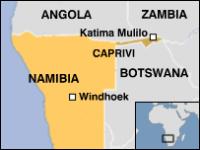







|
News and Information
Caprivi's short-lived rebellion
| August 8, 2007 |
 Caprivi's short-lived rebellion Caprivi's short-lived rebellion
The Caprivi Strip is a legacy of colonialism, a long finger of territory that pokes eastwads out of northern Namibia, and runs along the borders with Angola and Botswana towards Zambia and Zimbabwe.
It is the result of a territorial swap agreed between Britain and Germany in 1890. Britain acquired Zanzibar in east Africa, while Germany got the slice of land that later became known as the Caprivi Strip - giving it access to the Zambezi river, along the border of what is now Zambia.
The Caprivi Strip differs from the rest of Namibia geographically, politically and in its ethnic make-up. During the apartheid era, the territory was used by the South African army as a launch-pad for its operations in neighbouring Angola, and against guerrillas of the Namibian independence movement, Swapo.
After independence in 1990, senior members of Swapo have questioned the loyalty of the Caprivians, who tended to themselves with the main Namibian opposition party, the Democratic Turnhalle Alliance.
Arrests
The Caprivians, for their part, accused the government of neglecting the area - which was described by a recent United Nations report as Namibia's poorest region.
But it was not until 1998 that a secessionist movement emerged in Caprivi - the Caprivi Liberation Army - led by a man called Mishake Muyongo.
The Namibian security forces acted swiftly, arresting many suspected supporters of the new movement. More than 2,000 Caprivians fled into Botswana, including Mr Muyongo.
But beneath the apparent calm in Caprivi, the separatists had clearly been busy.
Their attacks on several targets in Katama Mulilo in 1999 took many Namibians by surprise.
Though relatively small in number, the Caprivi secessionists demonstrated, briefly, that the were a force to be reckoned with - armed and trained, according to the government, by the Unita rebel movement across the border in Angola.
This view was supported by the court's finding that some of the accused had travelled to Angola to procure weapons.
Support cut off
But by the end of the 1990s, the Angolan government - a firm ally of the Namibian government - was already gaining ground against Unita.
The death in 2002 of Unita's founder and leader, Jonas Savimbi, brought Unita's rebellion to an end, and left the Caprivi separatists without their support from across the border.
Mishake Muyongo had by that time fled to exile in Denmark, but 129 of his supporters were brought to trial in 2003.
Their trial has been a protracted one, not least because of their defence that they did not recognise the jurisdiction of the Namibian courts over their case.
Ten of them have now been convicted and sentenced. Their refusal to recognise the Namibian courts also means they are unlikely to exercise their right to appeal.
The trial of the remaining men is due to continue in September.
|
Source: www.bbc.com |
| http://news.bbc.co.uk/1/hi/world/africa/6937566.stm |
|
| Support Caprivi Freedom |
Fill out the form below to become a member of this site and receive our regular newsletter.
|

|

